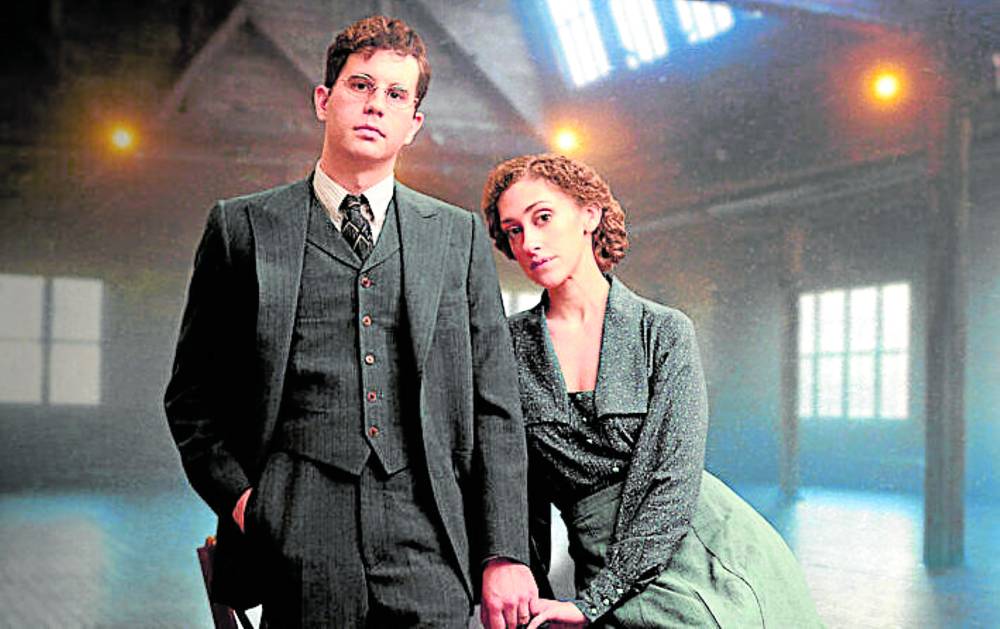Doing the difficult work

Ben Platt (left) and Micaela Diamond in “Parade”
NEW YORK—On an exceptionally frigid Friday, I headed over to 42nd Street for a couple of reasons: to say hello to friends who were in rehearsal for the revival production of the Tony-winning musical “Parade” (music and lyrics by Jason Robert Brown, and book by Alfred Uhry) and to catch a screening of BTS’ “Yet to Come in Cinemas.”
Since both were happening on the same street, I thought to hit two birds with one stone. Allow me to thank “Parade” cast member and one-time “Once on This Island” colleague Aurelia Williams for planting the idea to come visit, and to production stage manager Justin Scribner for handling the COVID-19 requirements. Thankfully, there weren’t too many hoops to jump through.
At close to 3 p.m., I walked into the rehearsal room and started to give and get those tight hugs and catch up with these beautiful people that I’ve missed working with.
Michael Arden, director of “Parade,” greeted me with a smile that stretched from one ear to the other. After pleasantries were exchanged with even more friends and a few introductions made for new ones, I was invited to stay for a little bit before the movie.
What ended up happening was something that awakened my soul and stirred my spirit.
For a little context, “Parade” is a musical that dramatizes the trial of Jewish factory manager Leo Frank, who is accused of raping and murdering 13-year-old Mary Phagan, an employee at this factory.
Triggering
Set in the years 1913 to 1916 in Atlanta, Georgia, the trial and sensationalism surrounding it encouraged antisemitism in both politicians and the common folk, which then led to the lynching death of Mr. Frank in 1915.
After rehearsing the opening of the show (acted and sung gorgeously by Ashlyn Maddox and Charlie Webb), the plan was to stage the finale of Act 1. There are elements within that first act closer that can be triggering for members of the cast, given the subject matter of the show and the time period in which it’s set.
Instead of staging things immediately, a conversation amongst members of the company and production took place, a conversation that emphasized the importance of doing this kind of difficult work.
Do villains know that they’re villains? Do people that we now recognize as bad people even realize the evil of their ways? As actors who are aware of what the people we’re portraying are unaware of, what is our entry point into justifying the behavior of the characters we’re playing? Who and what do we think about when dancing, singing, acting what we know as abhorrent?
Exploration and explanation
This kind of exploration and explanation can only take place in art, as it unearths emotional truths not usually present in history books.
It isn’t always pleasant or desirable to take the necessary step into asking the question, “How did this person get from this point to the next?”
The wonderful (and sometimes insanity-inducing) thing about jumping into a character, whether they’re good or evil, is being able to try and imagine what their lives might’ve been like without judging their actions, but justifying them … attempting to find whatever humanity they have … finding that they’re not that different or far removed from the actor … empathizing with even the most vile, venal and venomous of humans.
I left that rehearsal hall with a newfound invigoration in my step as I headed off to the movie theater for “Yet to Come.”
Once I found my seat, I was surrounded by fellow ARMY. Some were in lavender “Yet to Come” hoodies, others wielded their ARMY bombs (a few sheathed in the colors of their favorite members).
Glorious
For a couple of hours, I sat, sang and screamed with full-throated abandon, realizing an interesting juxtaposition: this is a city in which many people who looked like these seven young men were viciously attacked just for being who they are.
To see the members of BTS in their element glorious, loud and successful feels like a sort of indirect revenge, stating quite clearly that people who look like them … people who look like us will not and cannot be beaten down.
For sure, these young men had their own kind of difficult work to do and many obstacles to overcome, but overcome them they did and beautifully.
So where am I actually going with this article? Perhaps nowhere in particular, except to say that it is through art that we are able to examine and explore with our hearts what we might be unable to with our heads. That the language of art at its core is the speaking of emotional truths, and the seeking of humanity in the seemingly inhumane.
Maybe we’ll find that there’s not much of a difference between ourselves and whatever we assume is completely opposite to us, and that the line between good and evil might not be as cut and dry as we think.
There is never ever an inopportune time to conduct this examination, one that is necessary if we as human beings can hope to progress.
“Parade” begins previews at the Bernard Jacobs Theater on Feb. 21 and opens on March 16. “Yet to Come in Cinemas” is now showing in select movie theaters worldwide. For details, visit btsyettocomeincinemas.com